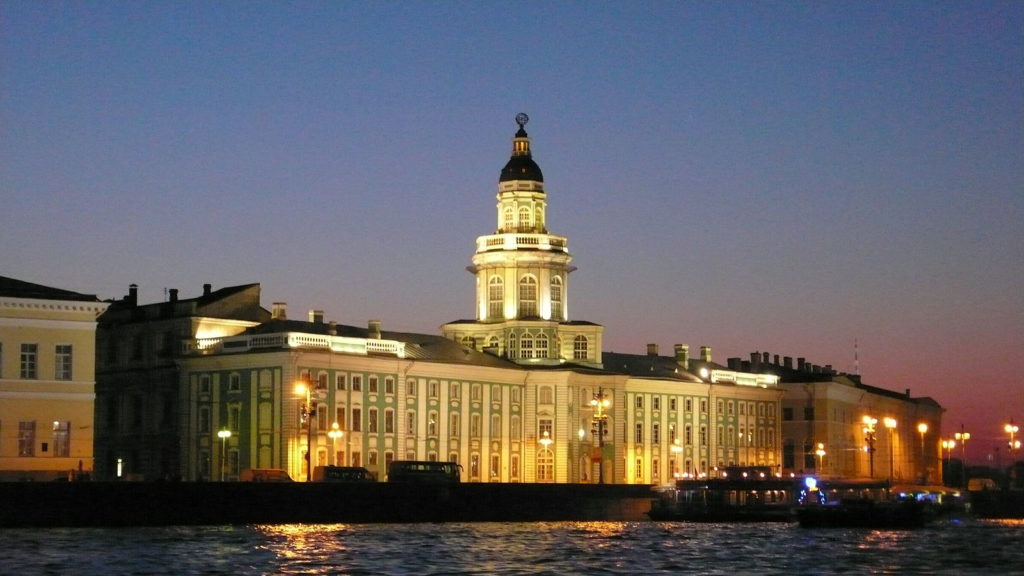Soloviev-Sedoy, Evening Song – Leningrad
The World Cup has been all over the news lately. Here in Germany, the flags came out for the occasion. Germans do not display their national flag routinely as we Americans do. Their 20th-century history leads them to shun displays of nationalism. But for the World Cup, German national flags flew proudly from car antennas and balcony railings.
National pride goes hand-in-hand with the World Cup. The games are being held in Russia this year, and although the Russian team was recently eliminated, we can still take a quick look at one manifestation of Russia’s national pride.
Vasily Soloviev-Sedoy is not a name most Americans will recognize, but his 1955 song “Moscow Nights” became quite popular. A 1961 recording by Kenny Ball and the Jazzmen (under the title “Midnight in Moscow”) hit number 2 on the pop charts. But the song was originally called “Leningrad Nights” and was changed to Moscow at the not-to-be-ignored suggestion of the Soviet authorities (after all, Moscow was the Soviet capital). Soon after, in 1957, Soloviev-Sedoy composed another lovely tune, “Evening Song – Leningrad,” with lyrics by Alexander Churkin. The residents of St. Petersburg (called “Leningrad” in the Soviet era) embraced it.

St. Petersburg suffered enormously in World War II, being under siege for 872 days from 1941 to 1944. Such events are not easily forgotten. But the lyrics to this song place that event in the background. The song dates from “the Thaw,” the post-Stalin period under Khrushchev. The heavy hand of Socialist-Realist politics in art had run its course. In Leningrad Poetry 1953-1975: The Thaw Generation (2010), Emily Lygo writes:
[T]he civic tone of Stalinist poetry gave way to the more lyrical, and less didactic tone of the Thaw, and the concerns of poetry shift from the public to the private sphere.
The new tone captured the imagination of the public, and the song became the city’s unofficial anthem. In 1981, the St. Petersburg soccer league latched onto the song. It is now sung before each game.
But the performance here has nothing to do with sports. The audience reaction exhibits something more deeply rooted than games won or lost. Some in the audience no doubt lived during the siege or grew up in its aftermath.
We need to say something about Dmitri Hvorostovsky. Last November my son called to tell me sadly that Hvorostovsky had died. I took the fact that he knew it before I did as a sign that I raised him right. How many Millennials keep up with the opera world?
Hvorostovsky (1962-2017) fit the image of the matinee idol, but there was no question that his extraordinary voice accounted for his success. (The Met recently paid this tribute to him.) Although he will be remembered in the U.S. primarily for his roles in opera, I always gravitated to his recordings of Russian songs by Rachmaninov, Tchaikovsky, and Sviridov. He frequently performed Russian folk songs as well. The Russian public viewed him as a beloved cultural icon, and that too is strongly in evidence in this video.
Text
|
Город над вольной Невой,
Город нашей славы трудовой,
Слушай, Ленинград, я тебе спою
Задушевную песню свою.
|
The city above the free Neva The working city of our glory Listen, Leningrad, I’ll sing to you my sincere song. |
|
Здесь проходила, друзья,
Юность комсомольская моя,
За родимый край с песней молодой
Шли ровесники рядом со мной.
|
Here was, friends, my Komsomol youth, To fight for the native land with the young song my peers went ahead with me. |
|
С этой поры огневой,
Где бы вы ни встретились со мной,
Старые друзья, в вас я узнаю
Беспокойную юность свою.
|
Since this time on fire, Wherever you met with me, Old friends, in you I recognize my own uneasy youth. |
|
Песня летит над Невой
Засыпает город дорогой
В парках и садах липы шелестят
Доброй ночи, родной Ленинград.
|
The song flies over the Neva The dear city falls asleep In parks and gardens lime trees rustle Good night, my home Leningrad. |



